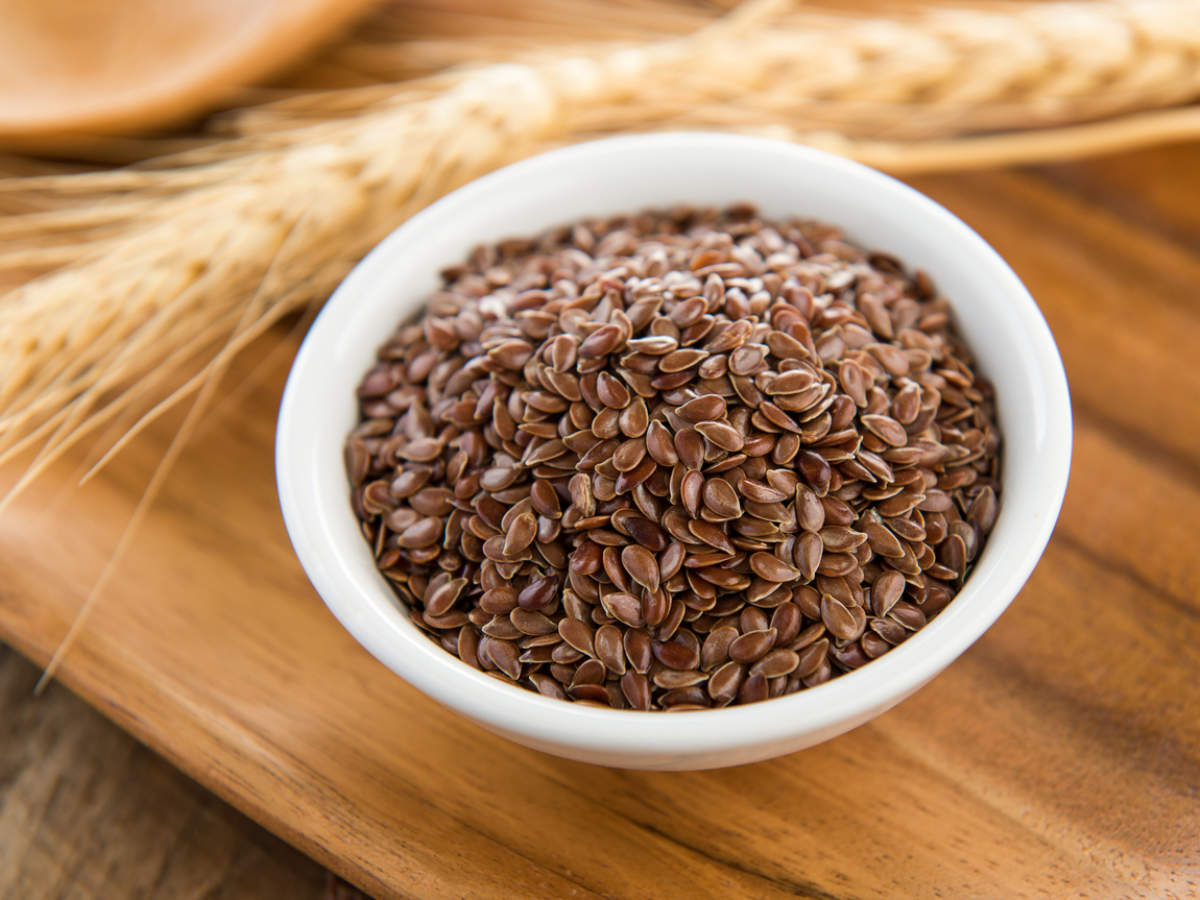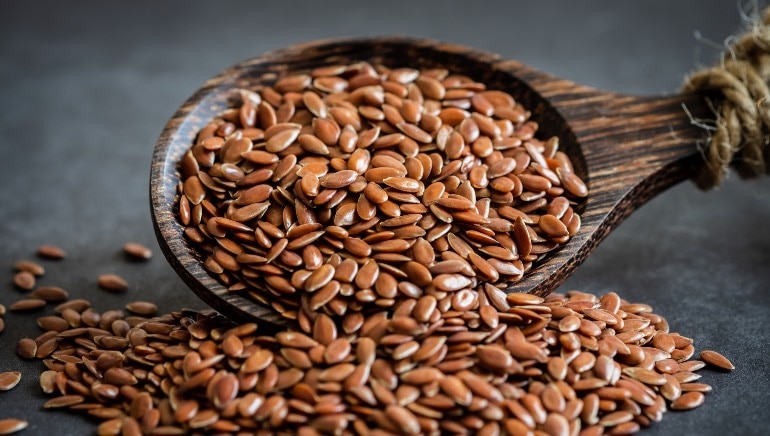How to have Flax seeds in winters and its benefits
Flax seeds, also known as linseed, are a versatile ingredient that can be added to many recipes. They are high in fiber, omega-3s, and healthy fats. Here are some ways to eat flax seeds: Flaxseed tea, Roast flaxseeds, Flaxseeds and yogurt, Flaxseeds smoothie, Flaxseed drink.
3 table spoons serving of flaxseeds contains:
- Omega-3 (ALA) 6,338mg
- Fiber 8g
- Protein 6g
- Vitamin B1 31% RDA
- Manganese 35% RDA
- Magnesium 30% RDA
- Phosphorus 19% RDA
- Selenium 10% RDA
- Also, flaxseeds contain a good amount of vitamin B6, Iron, potassium, copper and zinc

Everybody likes to have a healthy body and beautiful skin. Because, outer persona is equally important than inner strength. Whatever goes inside our body, it surely reflect out of our body, So there is a requirement to watch closely what we are eating and drinking, if we would like to have healthy body and beautiful skin. Today, I will be sharing the health and beauty benefits of eating flaxseeds.
Benefits of Flax Seeds:
- omega-3 fatty acid : Flax seeds are high in omega-3 fatty acid, which is not only good for our heart and diabetic patients. omega-3 fatty acids may lead to smoother, younger-looking skin with a visible reduction in inflammatory skin conditions like acne and psoriasis.
- Lignans are a rich source of estrogen, antioxidant and fiber that help in regulating hormone levels and supporting immune system.
- High in fiber Flax seeds are high source of fiber that includes both soluble and insoluble type. This is beneficial for heart health as it helps in reducing cholesterol level and blood pressure. The high fiber content makes you feel full for long hours and puts a halt to irregular food cravings.
How to eat Flax seeds:
Generally flax seeds are recommended to be eaten as grounded or powdered form. Half spoon of Flax seed with water helps your digestive system to work well. You can have flax seed with curd, salad or even sandwiches. Some people like to have them with baked food. Winter is the best time to include them in diet as they will in keeping the body warm in addition to providing numerous healthy and beauty benefits.
People who are suffering from constipation or irritable bowel movement should consult their doctor before including them in diet. Plus, flaxseeds generate heat in the body so they are risky to eat in summer season or in 1st Trimester or pregnancy. Flax seeds are an ideal source of omega 3 fatty acid for vegetarians . So, for a normal being winter is the right time to include Flaxseeds in your diet.
What is the Right Way to Consume Flax Seeds: Raw or Roasted ?
Flax seeds, renowned as a powerhouse of nutrition, should much rather be roasted before intake. Consuming them in their raw form and unprocessed state can position a risk due to the presence of certain harmful toxins. Although, if you’re committed to consuming them in a raw form, there is a safe way such as :
— By grinding the flax seeds and blending them with water, it releases all the water-soluble fibers in them, forming a gel-like consistency.
— To yield the nutritional benefits of flax seeds, one can also go for flax seed oil as an alternative for normal cooking oil.
— Scattering the flax seeds in your morning cereal, soup, or yogurt is another way to include them into your meals.

What are the steps to prepare Flax Seeds ?
While trying to roast the flax seeds, make sure they are clean and away of any impurities. Put them in a pan at a medium heat and roast for approximately 5 minutes, stirring constantly. If you opt to utilize a microwave, roast them for 6 minutes at temperatures around 180-190 degrees. Once prepared, let them cool down, and you can rejoice them at your comfort. The finest time to savor them is having it for breakfast.
Ways to Incorporate Flax Seeds into Your Meals ?
Attempt to experiment with wholesome flax seed recipes to make your meals more nutritious. One can include flaxseed in powder form into smoothies, soups, and raita, or even utilize it to substitute the salad dressing oil with flax oil. Being abundant in omega-3 and omega-6 fatty acids in flax seeds delivers a protective elixir for your body, shielding your cells from multiple types of damage.
Commence your day with a nutritious dose of flax by including it to your regular breakfast items, such as protein cereals, porridge as well as omelets.
You can also add flax seeds to: Baked foods, Oatmeal, Cereals, Pancake batter, Homemade veggie burgers, Overnight oats, Rotis, Sabzi, Salad, Bread.
To get the most nutrition from flax seeds, you can soak them in water before adding them to your meals. You can also grind them into a powder.
Health Benefits of Flax Seed
- High in Phytochemicals and Antioxidants:
- Cancer Prevention
- Digestion Improvision
- Prevent Cardiovascular diseases
- Control High Cholesterol
- Reduce Diabetes
- Fight Inflammation
- Reduces Hot Flashes
Flax Seeds are big source of omega 3 fatty acids which improve hair and skin.
- High in Antioxidants (Lignans) : The lignans present in flaxseeds improve the appearance of the skin by reducing the levels of DHT in the body.
- Wounds Healing : Flax Seed consumption minimize skin irritation, rashes, inflammation and redness. It also shrinks the possibility of acne, dermatitis and psoriasis.
- Skin conditioning & moisturizing: The essential fatty acids in flaxseed keep the skin hydrated and moisturized. Regular intake of flaxseeds increases the body’s natural oil production, keeping the skin baby soft
- Prevent Skin Cancer : Researchers have found that a diet rich in flaxseeds may protect the skin tissues from radiation, significantly reduce skin damage after sun exposure. The antioxidants present in flaxseeds fight the free radicals, preventing skin cancer.
- Acne Control : Sebum, am oil substance produce by flaxseeds prevent the onset of acne by just consuming 1-2 table spoon of flaxseed daily.
- Scrub : Mix Flax seed with yoghurt, honey scrub it for 10 minutes and wash off will gives you silky smooth skin and rejuvenates you skin cells.
Flaxseeds are packed with nutrients like protein, calcium, zinc, magnesium, iron and omega 3 fatty acids, which are required for the growth of your hair. A daily dose of flaxseeds can make your hair healthy, vibrant and strong.
- Prevents Hair Breakage : Consumption of omega 3 fatty acids increase hair’s elasticity which makes less prone to hair breakage and endows you with stronger hair.
- Dandruff control : The anti-inflammatory properties of flaxseeds reduce the possibility of dandruff, eczema and other scalp conditions.
- Reducing hypertension : Consumption of omega 3 fatty acids, and other nutritious values in flaxseeds result in reduced hypertension.
- Prevents Cicatricial alopecia : Including flaxseeds in your diet can help to ameliorate several hair conditions. The anti-inflammatory properties of flaxseeds prevent cicatricial alopecia, a permanent hair loss condition. Cicatricial alopecia damages the hair follicles severely, preventing the growth of healthy hair.
- Prevents Male Baldness : The alpha linolenic acid in flaxseeds inhibits 5 alpha reductase, an enzyme that converts testosterone into Dihydrotestosterone (DHT). DHT shrinks the hair follicles, leading to baldness. The ALA, linolenic acid and oleic acid in flaxseeds are used as natural remedies to treat male baldness. It also prevents hair loss due to Telogen effluvium.






